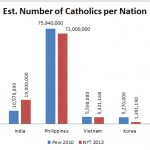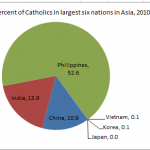Protestant-Catholic similarities and distinctions have been a theme of mine in several blog posts, and that is the case today as well. I have tried not to be too evangelical about such things, but rather enlightening, because the process of shifting from one to the other has been nothing if not educational. Today’s subject: the difference between Protestant ministers and Catholic priests, as best I can discern it.
The title above is a bit deceiving, because a Catholic priest can be referred to as a pastor, and some Protestant pastors—I’m thinking of the Episcopalians—are referred to as priests. And yes, I know we’re all supposed to be ministers and all that. But you get the drift—I’m talking about pastors as professionals from the near side of the Protestant Reformation and priests as professionals coming from the far side of it. So, after 40 years of observing the former—including 18 years in the home of one—and about 1.5 short years of watching the latter, here’s a list of differences and similarities.
1. Priests are men. Pastors are not necessarily men. (Don’t worry, it gets more interesting than this.)
2. Pastors can marry. Priests cannot marry, although some priests are married (but only if they were married clergy in the Anglican Communion and then converted). Indeed, many evangelical congregations don’t trust unmarried male ministers. And Catholic congregations would, of course, require a good explanation for a married one.
3. Pastors may have biological children. So may priests. But the only kind of priest that can have children and not get into trouble is the kind I mentioned in #2 and also priests who have sought ordination after their wife passed away. I know of at least one.
4. Pastors are encouraged—I hope and presume—to have a sexual relationship with their spouse. (But please, not on the roof. And spare us the details.) Priests, however, are “married” to the Church. Celibacy is not a rejection of sexuality. Chosen celibacy is intended to be a symbol of the resurrection, a prefiguring in the here-and-now of the union of Christ and his Church, the time and place in which we will no longer give and be given in marriage. (These aren’t my own words, by the way.) Ergo, any chatter about the poor priests who have to be celibate is wasting their breath. They chose it freely. It’s a doctrine that could be changed, but the college of bishops continues to show no interest in doing so. In a world that–despite all our technology and development–seems fixated with sex, this will likely continue to perplex people, especially outside the Church.
5. Speaking of marriage, I have seen no difference in priests or pastors in their understanding of Christian marriage and how they work, both optimally and in reality. John Paul II was a genius about marriage. I’ve gotten good advice about the matter from both.
6. Priests, since they have no immediate family obligations, obviously experience their day-to-day life in a slightly different manner than do married Protestant pastors. They don’t go home to the family; they retire to the rectory. Their own food preparation arrangements, I suspect, vary widely, depending on the size of the parish, if they have a cook, etc. I think they enjoy a good meal invitation, but don’t often get them.
7. Priests are paid less well than most (but not all) Protestant pastors. No, they don’t just get a check from Rome. Parishes, like most churches, are typically organized and underwritten locally. Catholics are less prone to tithe than Protestants. Priests probably have more modest monthly expenses than Protestant pastors.
8. The average priest is more educated than the average Protestant minister. This is a function of the preparation, which takes years—typically closer to 10 than five. Standard Protestant seminary education takes four years or so, and not a few ministers don’t go to a formal seminary at all.
9. You can’t just decide to be a priest, but you can just decide to be a pastor. Since no one’s stopping you from hanging a shingle and starting another congregation, there are no organizational barriers to becoming a Protestant minister, unless you go through denominational ordination. Given the sink-or-swim reality of Protestant congregations, I suspect Protestant pastors are more apt to exhibit the sort of charismatic authority of which Max Weber wrote. Ergo, their leadership is more widely known than Catholic leadership.
10. Due to #8 and #9, smaller Catholic families, and from what appears to me to be an increasingly stringent discernment process, there is a significant priest shortage in the United States. It’s not really possible to speak of a minister shortage within Protestantism, only within particular denominations.
11. As a result of #10, priests are more often of a different color, race, or nationality (compared to their congregation) than pastors are. This can be enriching, of course, and frustrating. I once got some of the most blunt (and needed) advice about something from an Indian priest. And at other times I could barely understand him.
12. While I’m not sure priests work longer hours than pastors—I suspect it’s comparable—many priests work stranger hours. In many parishes of any size, there is daily Mass—often first thing in the morning—and several times on Sunday. I don’t know too many pastors who are leading worship Monday morning at 6:30am. (My father relished his Mondays; they were his sabbath.) A couple weeks ago I had the fine experience of receiving the Eucharist from our newest cardinal, New York archbishop Timothy Dolan, at 7:30 in the morning. They do keep different hours, don’t they?
13. As a result of #12, the average priest probably delivers far more sermons—called homilies—than the average minister. In my parish, I think they do about one a day.
14. As a result of #13, the average Catholic homily is not only shorter than the average Protestant sermon—I can virtually guarantee that—but probably not as remarkable in presentation. The focus of the Mass is the Eucharist, not the sermon. But that’s no excuse for poor homilies, just an explanation. On the other hand, length is no guarantee of quality. Dolan’s 7:30am homily was only a few minutes long–standard for that early in the morning–but I still remember its key point (about magnanimity).
15. Priests pretty much wear the clerical garb, while Protestant pastors can dress in suits, ties, hipster jeans, or whatever they wish. Thus priests are more publicly visible as priests than are Protestant ministers.
16. Priests hear a lot more confessions of personal sin than do Protestant pastors. I can guarantee that. (Don’t ask them to talk about it, because they can’t, and won’t.) This is in part because in Catholicism priests are given authority to act in persona Christi to forgive sin. Protestant ministers don’t do that, and as a result are treated to much less direct reports of sin. I covered this before.
17. Priests are much less subject to market forces and consumer demand than Protestant ministers, many of whom basically sing for their supper. (And in megachurches, that supper is often well into six-figures). This is not to say that priests don’t cater to their flock, or that ministers simply tell their congregants what their itching ears want to hear. I’m just noting that there are some things that are easier to say when your job is secure.
18. Related to that, I think (though I’m not sure) priests can be a bit more difficult to get to know personally than pastors are. As you can see, they function differently and are subject to different requirements, expectations, demands, and forces. They are, in some ways, set apart. I suspect they feel that, and sometimes poignantly sense the cost of that. On the other hand, I think Protestant pastors tend to live in a fishbowl–observed and evaluated by their flocks–more than priests.
19. And yet I have found most Catholic priests to be as warm, genuine, and normal as any Protestant minister I have ever met. There is great diversity among them, as is true among ministers. Part of that is due to their distinctive “spiritualities,” and sometimes to their different orders (e.g., Paulists, Benedictines, Franciscans, etc.). As a simple example, I bought some nice Starbucks French-roast coffee for our rector, because I knew he liked a good cup of coffee. But the assistant priest, a Franciscan by order, likes tea. Lipton. I wanted to get something fancier, but the Fransciscans don’t do fancy. Just simple.
20. Priests very likely spend less time thinking creatively about the other details of worship services than do Protestant ministers. In part because those other details don’t vary widely from day to day or week to week. Innovation in worship is not the value in Catholicism that it is in some shades of Protestantism. Some of this no doubt has to do with point #17.
OK, twenty is enough. Corrections, alternative perspectives, and comments welcome.











